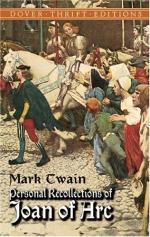“I have done best to serve and obey my sovereign Lord and Master.”
After a while the matter of Joan’s Standard was taken up, in the hope of connecting magic and witchcraft with it.
“Did not your men copy your banner in their pennons?”
“The lancers of my guard did it. It was to distinguish them from the rest of the forces. It was their own idea.”
“Were they often renewed?”
“Yes. When the lances were broken they were renewed.”
The purpose of the question unveils itself in the next one.
“Did you not say to your men that pennons made like your banner would be lucky?”
The soldier-spirit in Joan was offended at this puerility. She drew herself up, and said with dignity and fire: “What I said to them was, ‘Ride those English down!’ and I did it myself.”
Whenever she flung out a scornful speech like that at these French menials in English livery it lashed them into a rage; and that is what happened this time. There were ten, twenty, sometimes even thirty of them on their feet at a time, storming at the prisoner minute after minute, but Joan was not disturbed.
By and by there was peace, and the inquiry was resumed.
It was now sought to turn against Joan the thousand loving honors which had been done her when she was raising France out of the dirt and shame of a century of slavery and castigation.
“Did you not cause paintings and images of yourself to be made?”
“No. At Arras I saw a painting of myself kneeling in armor before the King and delivering him a letter; but I caused no such things to be made.”
“Were not masses and prayers said in your honor?”
“If it was done it was not by my command. But if any prayed for me I think it was no harm.”
“Did the French people believe you were sent of God?”
“As to that, I know not; but whether they believed it or not, I was not the less sent of God.”
“If they thought you were sent of God, do you think it was well thought?”
“If they believed it, their trust was not abused.”
“What impulse was it, think you, that moved the people to kiss your hands, your feet, and your vestments?”
“They were glad to see me, and so they did those things; and I could not have prevented them if I had had the heart. Those poor people came lovingly to me because I had not done them any hurt, but had done the best I could for them according to my strength.”
See what modest little words she uses to describe that touching spectacle, her marches about France walled in on both sides by the adoring multitudes: “They were glad to see me.” Glad?
Why they were transported with joy to see her. When they could not kiss her hands or her feet, they knelt in the mire and kissed the hoof-prints of her horse. They worshiped her; and that is what these priests were trying to prove. It was nothing to them that she was not to blame for what other people did. No, if she was worshiped, it was enough; she was guilty of mortal sin.




